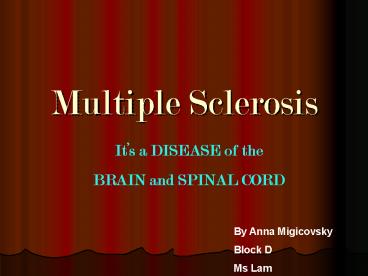Multiple Sclerosis PowerPoint PPT Presentation
1 / 13
Title: Multiple Sclerosis
1
Multiple Sclerosis
Its a DISEASE of the BRAIN and SPINAL CORD
By Anna Migicovsky Block D Ms Lam
2
Outline
- What is Multiple Sclerosis (MS)?
- What causes MS?
- -Theories
- Who gets it?
- Symptoms
- Diagnosis
- Treatment / Management
- Facts
- Summary
3
What is Multiple Sclerosis?
- When a person has MS, the covering (myelin) that
protects the nerves in the brain and spinal cord
is affected and slows down the message or blocks
it. - Example when the brain tells your hand to
wave, the damaged myelin might disrupt the
message so it will not be clear or will not reach
the hand at all! - Multiple Sclerosis interferes with the brains
ability to control such functions as SEEING,
WALKING, TALKING, etc - - is NOT a MENTAL illness
- - is NOT CONTAGIOUS
- - is NOT PREVENTABLE or CURABLE
4
What Causes MS?
- One of Medicines Biggest Mysteries - cause is
unknown - no cure discovered - no way to know
who gets MS
?
?
?
?
Continue...
5
Scientists have 4 Theories
- Virus Attack
- Immune Reaction
- -when our built in defense system backfires
- and attacks its own tissues by mistake
- Genetic Predisposition
- Combination
- - when a virus attacks the body and the immune
system becomes - confused and attacks both host cells and
virus.
6
Who gets MS? Cant predict but there is a
pattern
- Young Adults (between 20-40 yrs old)
- Women
- People in Temperate Zones (cold places)
- - Example Canada
- People with Genetic Predisposition
7
Symptoms of MSSymptoms vary greatly from person
to person and at different times during one
persons illness.
- Problems with vision, speech, coordination,
balance, and bladder control - Partial or complete PARALYSIS of any part of the
body - Extreme Fatigue
- SHAKING of hands
- Numbness or Pricking feeling
- Obvious DRAGGING of feet
8
MS Diagnosis
2 Basic Signs to Confirm MS Signs of nervous
system damage - Numbness in hands and feet or
unexplained paralysis Come-and-Go pattern -
Symptoms of MS usually appear and disappear
without warning
9
Treatment / Management
- Overall Health Maintenance
- - stay active, eat nutritious diet, get adequate
rest - Physical and Occupational therapy
- - Exercise and muscle retraining will help
recovery of MS attacks - Psychotherapy and Counseling
- - Therapy will help with depression and
anxieties caused by MS - Medication
- - Drugs are sometimes used to relieve specific
symptoms - On-going Re-evaluation
- - MS is unpredictable so continuing medical
supervision is essential
10
Facts
- Estimated 50, 000 Canadians have MS
- 1 out of 3 people with MS have a mild form
- 3 out of 4 people with MS are still active and
can take care of daily needs after diagnosis of
MS - The life span for most people with MS is usually
near normal
11
To Summarize
- Multiple Sclerosis
- Can interfere with seeing, walking and talking
- Symptoms can appear and disappear without warning
- is NOT a MENTAL illness
- is NOT Contagious
- Has unknown cause
- Has no cure
- Canadians are at higher risk
12
- "It's not what the person with MS has LOST...
- it's what he or she HAS LEFT that counts!1
1 Multiple Sclerosis Society of Canada. What
everyone should know about Multiple Sclerosis.
USA Channing L. Bete Co., Inc.1996 p. 9.
13
Bibliography
- 1) Bunch, Bryan. Diseases.Volume 5. USA
Scientific Publishing Inc, 2003. - Pamphlets
- 2) Multiple Sclerosis Society of Canada.Facts for
persons recently diagnosed with multiple
sclerosis. 2004 - 3) Multiple Sclerosis Society of Canada. What
everyone should know about Multiple Sclerosis.
USA Channing L. Bete Co., Inc.1996 - http//www.nmss.org/
- http//www.mssociety.ca/
- http//medstat.med.utah.edu/kw/ms/overview.html

